
David Ionovich Bronstein was a Soviet chess player. Awarded the title of International Grandmaster by FIDE in 1950, he narrowly missed becoming World Chess Champion in 1951. Bronstein was one of the world's strongest players from the mid-1940s into the mid-1970s, and was described by his peers as a creative genius and master of tactics. He was also a renowned chess writer; his book Zurich International Chess Tournament 1953 is widely considered one of the greatest chess books ever written.

The USSR Chess Championship was played from 1920 to 1991. Organized by the USSR Chess Federation, it was the strongest national chess championship ever held, with eight world chess champions and four world championship finalists among its winners. It was held as a round-robin tournament with the exception of the 35th and 58th championships, which were of the Swiss system.

Paul Keres was an Estonian chess grandmaster and chess writer. He was among the world's top players from the mid-1930s to the mid-1960s, and narrowly missed a chance at a World Chess Championship match on five occasions. As Estonia was repeatedly invaded and occupied during World War II, Keres was forced by the circumstances to represent the Soviet Union and Nazi Germany (1941–44) in international tournaments.
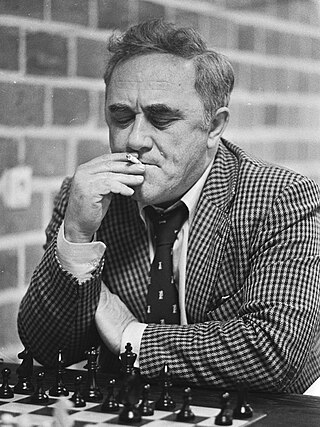
Efim Petrovich Geller was a Soviet chess player and world-class grandmaster at his peak. He won the Soviet Championship twice and was a Candidate for the World Championship on six occasions. He won four Ukrainian SSR Championship titles and shared first in the 1991 World Seniors' Championship, winning the title outright in 1992. His wife Oksana was a ballet dancer while his son Alexander was also a chess master. Geller was coach to World Champions Boris Spassky and Anatoly Karpov. He was also an author.
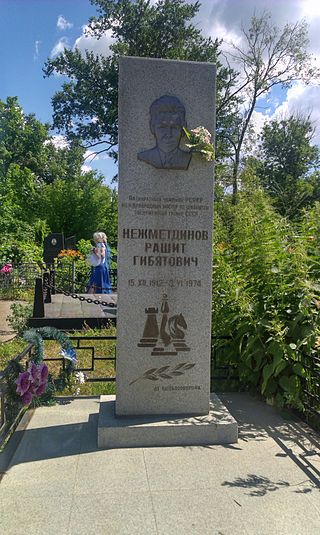
Rashid Gibyatovich Nezhmetdinov was a Soviet chess player, chess writer, International Master and checkers player. Although he never attained the title of Grandmaster, he was a renowned tactician and created several brilliant games. Biographer Alex Pishkin compares him to Chigorin, Réti and Spielmann.
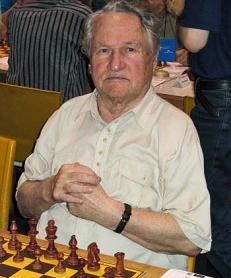
Ratmir Dmitrievich Kholmov was a Russian chess Grandmaster. He won many international tournaments in Eastern Europe during his career, and tied for the Soviet Championship title in 1963, but lost the playoff. Kholmov was not well known in the West, since he never competed there during his career peak, being confined to events in socialist countries. His chess results were impressive, so this may have been for security reasons, as Kholmov had been a wartime sailor. But he was one of the strongest Soviet players from the mid-1950s well into the 1970s, and was ranked as high as No. 8 in the world by Chessmetrics.com from August 1960 to March 1961. Kholmov stayed active in competitive chess right to the end of his life, and maintained a high standard of play past the age of 80.

Vladimir Borisovich Tukmakov is a Ukrainian chess grandmaster. He gained the Grandmaster title in 1972.
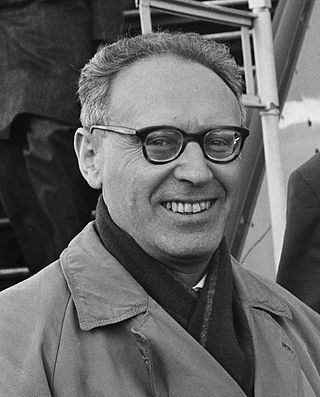
At the World Chess Championship 1963, Tigran Petrosian narrowly qualified to challenge Mikhail Botvinnik for the World Chess Championship, and then won the match to become the ninth World Chess Champion. The cycle is particularly remembered for the controversy surrounding the Candidates' Tournament at Curaçao in 1962, which resulted in FIDE changing the format of the Candidates Tournament to a series of knockout matches.
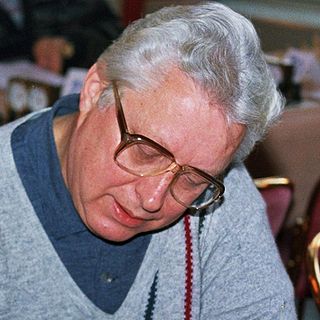
Evgeni Andreyevich Vasiukov was a Russian chess player, one of the strongest in the world during his peak. He was awarded the title of Grandmaster by FIDE in 1961. During his career, he won the Moscow Championship on six occasions and scored numerous victories in international tournaments, such as Belgrade Open 1961, Moscow International 1961, East Berlin 1962, Reykjavik 1968, and Manila 1974. He was rarely at his best in Soviet Championship Finals, which were among the very toughest events in the world, and never made the Soviet team for an Olympiad or a European Team Championship. Vasiukov won the World Senior Chess Championship in 1995.
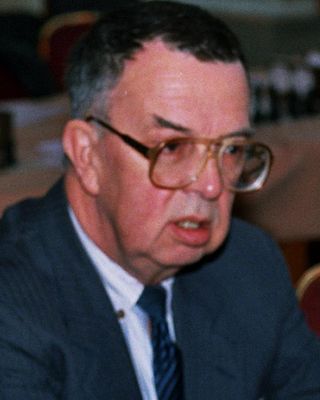
Nikolai Vladimirovich Krogius was a Russian chess Grandmaster, International Arbiter (1985), psychologist, chess coach, chess administrator, and author. He won several tournament titles at Sochi and in Eastern European events, and appeared in seven Soviet finals from 1958–71. His peak was in 1967 when he ranked 18th in the world for a time. He earned his doctorate in psychology, and specialized in sports psychology. He coached World Champion Boris Spassky for several years, also served as chairman of the USSR Chess Federation, and co-authored five chess books. He was the co-winner of the 1993 World Senior Chess Championship.

Viktor Lvovich Korchnoi was a Soviet and Swiss chess grandmaster (GM) and chess writer. He is considered one of the strongest players never to have become World Chess Champion.

Semyon Abramovich Furman was a Soviet chess player and trainer of Belarusian Jewish origin. He was awarded the title of Grandmaster by FIDE in 1966. Furman is best known for developing Anatoly Karpov into a World Chess Champion, but was a formidable player himself, as well as a successful coach for several other world-class players. His name is sometimes written as Semen or Semion Furman.
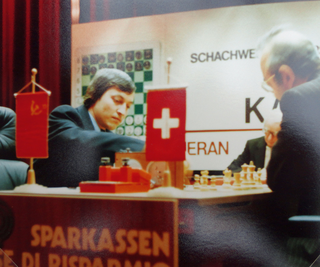
The major chess events of 1981 were the final match of the Candidates Tournament and the second Karpov–Korchnoi World Chess Championship match.
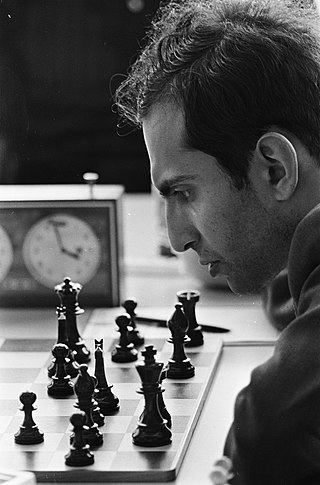
The 1957 Soviet Chess Championship was the 24th edition of USSR Chess Championship. Held from 20 January to 22 February 1957 in Moscow. The tournament was won by Mikhail Tal. The final were preceded by quarterfinals events at Frunze, Tallinn, Yerevan ; semifinals at Leningrad, Kharkov and Tbilisi.

The 1958 Soviet Chess Championship was the 25th edition of USSR Chess Championship, held from 12 January to 14 February 1958 in Riga. The tournament was won by Mikhail Tal. The final was preceded by quarterfinals events at Tbilisi, Minsk and Ashkhabad ; semifinals at Leningrad, Sverdlovsk and Kiev.

The 1960 Soviet Chess Championship was the 27th edition of USSR Chess Championship. Held from 26 January to 27 February 1960 in Leningrad. The tournament was won by Viktor Korchnoi. The final were preceded by semifinals events at Cheliabinsk, Tallinn and Yerevan. Mikhail Tal was missing, preparing for his world title match against Botvinnik. Paul Keres was in Cuba as part of a cultural delegation from Estonia.

The 1962 Soviet Chess Championship was the 30th edition of USSR Chess Championship. Held from 21 November to 20 December 1962 in Yerevan. The tournament was won by Viktor Korchnoi. It was preceded by six semifinals events at Dnipropetrovsk, Novosibirsk, Riga and three of which were simultaneously the finals of the championships of the sports societies Spartak, Trud and Burevestnik.

The 1964 Soviet Chess Championship was the 32nd edition of USSR Chess Championship. Held from 25 December 1964 to 27 January 1965 in Kiev. The tournament was won by Viktor Korchnoi. The final were preceded by semifinals events at Kishinev and Minsk.

The 1970 Soviet Chess Championship was the 38th edition of USSR Chess Championship. Held from 25 November to 28 December 1970 in Riga. Viktor Korchnoi won his fourth title. The future world champion Anatoly Karpov had a quiet debut, beginning with a loss and 10 draws out of the first 11 rounds before beating Vladimir Bagirov in an Alekhine Defence in round 12. Mikhail Tal should have played in Riga, his home town, but he didn't. It looks as if the organizers doubted, on his recent illness history, whether he would last out the 21-rounder. It was a decision that was to rankle for years, especially since Tal was physically present, but had to confine himself to the press room.
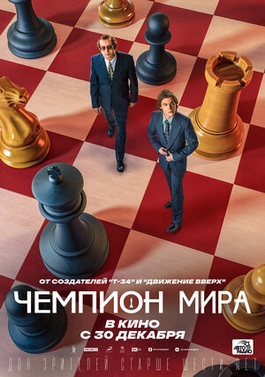
Champion of the World is a 2021 Russian sports drama film written and directed by Aleksey Sidorov. The film tells the story of the rivalry between the Soviet Union's venerable sports artist, chess player Anatoly Karpov, who is competing against Viktor Korchnoi for the title of World Chess Championship.



















